Table of Contents[Hide][Show]
Without a doubt, eating healthy protein sources is critically important to good health. And as a vegetarian following a diabetes diet, protein can be a little more confusing since it’s not as simple as saying eat meat or chicken.
Let’s clear up any confusions you may have and lay out all your sources of vegetarian protein to choose from – there are actually many, and with variety of choice, you’ll be certain to get enough in your diet.
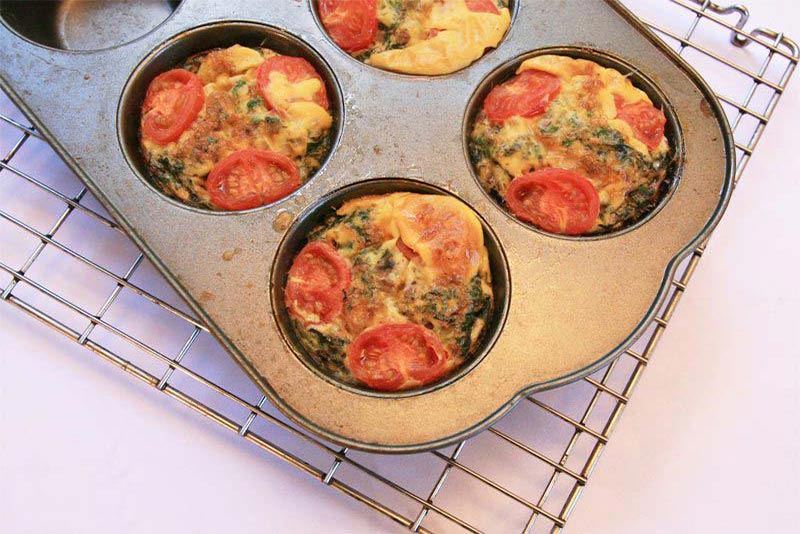
Complete and Incomplete Proteins
If you’ve spent some time flipping through health magazines or learning about nutrition online then you’ve probably come across the terms “complete” and “incomplete proteins.”
These terms get thrown around a lot in health and wellness circles, but what do they actually mean?
In short, a complete protein is a food source that contains all of the nine essential amino acids. On the flip side, an incomplete protein still contains amino acids (there are also 11 non essential ones), but not all of the nine essential ones.
These nine “essential” amino acids (phenylalanine, valine, threonine, tryptophan, methionine, leucine, isoleucine, lysine, and histidine) are the only amino acids that the human body cannot synthesize on its own. This means you must consume them through your diet on a regular basis.
After you eat protein in a meal, it gets digested and broken down into the various amino acids, which are then used all over the body for different functions.
Getting the proper amount and type of protein is important because not only is protein required for the formation of strong muscles, but it also plays a role in hormone construction, immune system regulation, and other metabolic processes.
If your diet includes some meat, chances are that you’ll never have a problem getting enough of the right protein because animal products are naturally complete proteins.
However, if you’re eating a vegetarian diet then things get a little more tricky because almost all plant based foods are incomplete proteins.
Because of this, vegetarians need to be purposeful with their diets and make sure to eat plenty of protein-rich foods from a variety of different sources like eggs, nuts, seeds, cheeses, and soy products.
Eggs
Eggs are one of the only complete proteins available to vegetarians, so be sure to eat them on a regular basis. And don’t skip out on the yolk either as the yolks are the most nutritious part of the egg!
Many health-conscious people are scared away from egg yolks because of the old correlation between dietary cholesterol and blood cholesterol levels, but modern research has shown that this claim doesn’t hold much weight. And that in actual fact, eggs can improve your cholesterol profile!
Whole eggs are a great source of complete protein and monounsaturated fat (which has anti-inflammatory properties) so enjoy eggs any way you like them – poached, hard-boiled, scrambled, or in a delicious salad for lunch!
Nutrition facts for 1 large poached egg:
Calories: 72 | Fat: 4.74 g | Protein: 6.25 g | Total Carbs: 0.35 g | Fiber: 0 g | Net Carbs: 0.35 g
Dairy Products
Greek yogurt
Dairy products like Greek yogurt and cheese are stable sources of protein and fat. But in terms of yogurt, some products do contain more carbs than others, so make sure to check nutrition labels. Always look for plain (unsweetened) yogurt and keep in mind that Greek yogurt tends to provide more protein than traditional yogurt.
Alongside eggs, dairy products are another example of a complete protein that vegetarians can rely on.
Nutrition facts for 100 g of plain Greek yogurt:
Calories: 97 | Fat: 5 g | Protein: 9 g | Total Carbs: 3.98 g | Fiber: 0 g | Net Carbs: 3.98 g

Cheddar cheese
Nutrition facts for 1 slice (28 g) of cheddar cheese:
Calories: 113 | Fat: 9.33 g | Protein: 6.4 g | Total Carbs: 0.87 g | Fiber: 0 g | Net Carbs: 0.87 g
Cottage cheese
Nutrition facts for 1 cup of 2% milkfat cottage cheese:
Calories: 183 | Fat: 5.13 g | Protein: 23.62 g | Total Carbs: 10.76 g | Fiber: 0 g | Net Carbs: 10.76 g
Mozzarella cheese
Nutrition facts for 1 slice (28.3 g) of mozzarella cheese:
Calories: 85 | Fat: 6.33 g | Protein: 6.28 g | Total Carbs: 0.62 g | Fiber: 0 g | Net Carbs: 0.62 g
Seeds
Seeds are rich sources of fat, protein and fiber.
You can snack on a handful of pumpkin seeds or sunflower seeds plain or sprinkle them onto a salad for a little crunch. Chia seeds are known as a “superfood” and a few tablespoons of them make a great addition to smoothies, just be sure to soak them in a few ounces of water beforehand in order to make their fats more bioavailable.
Chia seeds
Chia seeds are a complete protein and most of the fat is polyunsaturated, with a high amount of beneficial omega-3 fats.
Nutrition facts for 1 ounce (28.3 g) of dried chia seeds:
Calories: 138 | Fat: 8.71 g | Protein: 4.69 g | Total Carbs: 11.94 g | Fiber: 9.8 g | Net Carbs: 2.14 g
Hemp seeds
Hemp seeds are a complete protein that can be used sprinkled over meals, in smoothies or to top low carb cereals.
Nutrition facts for 2 tablespoon (20 g) of hemp seeds:
Calories: 111 | Fat: 9.75 g | Protein: 6.31 g | Total Carbs: 1.73 g | Fiber: 0.8 g | Net Carbs: 0.93 g
Pumpkin seeds
Nutrition facts for 1 ounce of roasted pumpkin seeds:
Calories: 126 | Fat: 5.5 g | Protein: 5.26 g | Total Carbs: 15.24 g | Fiber: 5.2 g | Net Carbs: 10.04 g
Sunflower seeds
Nutrition facts for 1 ounce of roasted sunflower seeds:
Calories: 155 | Fat: 14.12 g | Protein: 5.48 g | Total Carbs: 4.34 g | Fiber: 2.6 g | Net Carbs: 1.74 g
Please pin, tweet or share; then keep on reading.
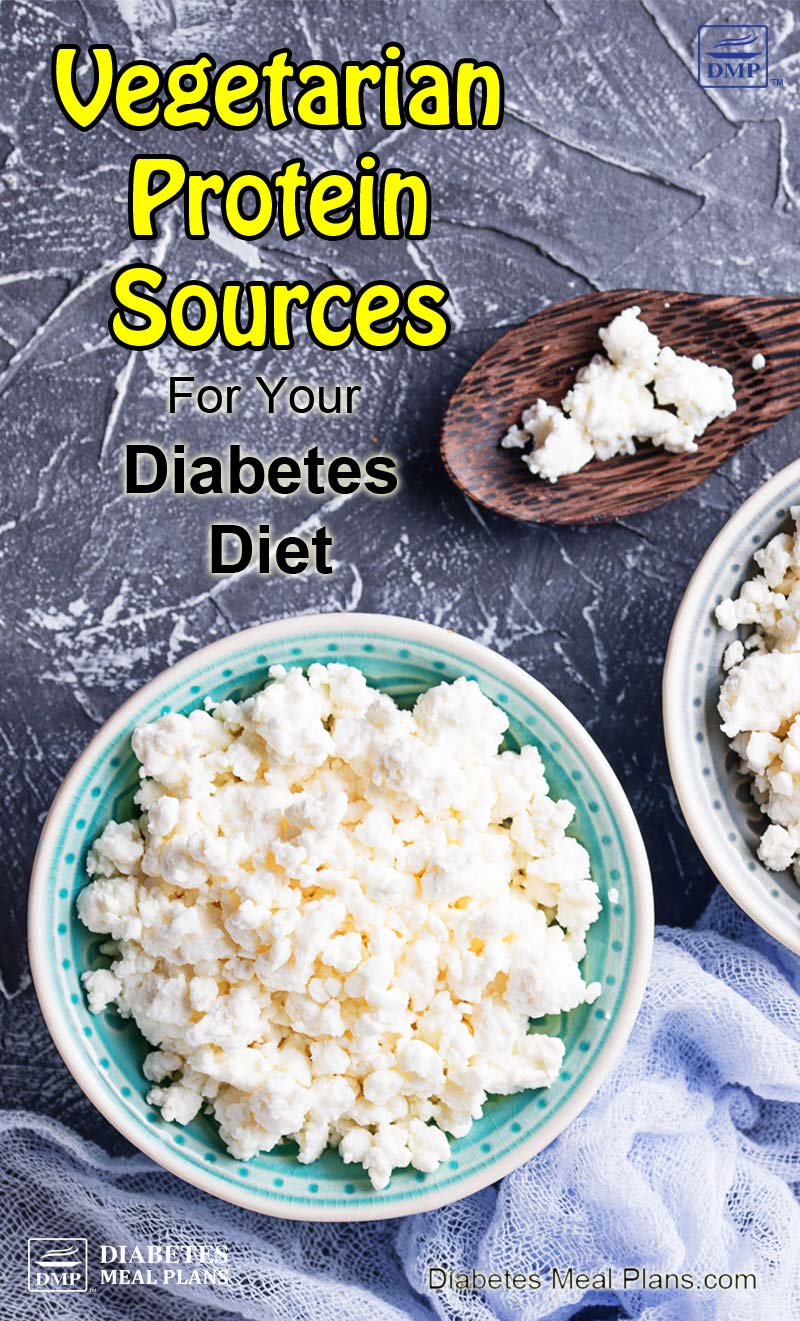
Nuts and nut butters
Nuts and peanuts are superior snack foods.
They’re easy to grab on the go or add to a green salad. You can mix nuts into Greek yogurt to give your breakfast an extra protein boost, or you can spread a tablespoon of nut butter onto a low carb cracker for a quick pick-me-up between meals.
Peanuts and peanut butter
Nutrition facts for 1 ounce of peanuts:
Calories: 161 | Fat: 13.96 g | Protein: 7.31 g | Total Carbs: 4.57 g | Fiber: 2.4 g | Net Carbs: 2.17 g
Nutrition facts for 2 tablespoons (32 g) of chunky peanut butter:
Calories: 190 | Fat: 16.47 g | Protein: 8.34 g | Total Carbs: 5.66 g | Fiber: 1.8 g | Net Carbs: 3.86 g
Almonds and almond butter
Nutrition facts for 1 ounce of almonds:
Calories: 164 | Fat: 14.16 g | Protein: 6 g | Total Carbs: 6.11 g | Fiber: 3.5 g | Net Carbs: 2.61 g
Nutrition facts for 2 tablespoons (32 g) of almond butter:
Calories: 196 | Fat: 17.76 g | Protein: 6.71 g | Total Carbs: 6.02 g | Fiber: 3.3 g | Net Carbs: 2.72 g
Cashews and cashew butter
Nutrition facts for 1 ouch of cashews:
Calories: 157 | Fat: 12.43 g | Protein: 5.17 g | Total Carbs: 8.56 g | Fiber: 0.9 g | Net Carbs: 7.66 g
Nutrition facts for 2 tablespoons (32 g) of cashew butter:
Calories: 188 | Fat: 15.81 g | Protein: 5.62 g | Total Carbs: 8.82 g | Fiber: 0.6 g | Net Carbs: 8.22 g
Beans and legumes
In small portions, beans and legumes can help to add protein and variety to your meals. Add them to soups, stews, and salads, but pay special attention to the amounts you’re using.
You absolutely must be mindful that while beans and legumes contain some protein, they are also much higher in carbs than the proteins already mentioned above. So again, small portions (1/4 cup per serve is generally a good rule) is key to keeping blood sugar levels in check.
Black beans
Nutrition facts for 1/4 cup of black beans:
Calories: 54.5 | Fat: 0.1 g | Protein: 3.6 g | Total Carbs: 9.8 g | Fiber: 4.1 g | Net Carbs: 5.7 g
Kidney beans
Nutrition facts for ½ cup of kidney beans:
Calories: 108 | Fat: 0.77 g | Protein: 6.68 g | Total Carbs: 18.65 g | Fiber: 5.5 g | Net Carbs: 13.15 g
Chickpeas (Garbanzo beans)
Nutrition facts for ½ cup of chickpeas:
Calories: 134 | Fat: 2.12 g | Protein: 7.27 g | Total Carbs: 22.48 g | Fiber: 6.2 g | Net Carbs: 16.28 g
The exception to the “small portions” rule is beans and legumes that are sprouted. These contain fewer carbs but still carry ample protein so you can eat them more abundantly without racking up too many carbs.
Sprouted black beans
Nutrition facts for ½ cup of sprouted black beans:
Calories: 27 | Fat: 0.46 g | Protein: 3.86 g | Total Carbs: 3.77 g | Fiber: 0 g | Net Carbs: 3.77 g
Compared to unsprouted, you’re slashing off 16 grams of carbs – just by sprouting!
Soy products
Unlike other beans and legumes, soy products are a complete protein, plus they tend to contain less carbs than other beans and legumes. Therefore, foods such as tofu and tempeh are examples of soy products that can act as the perfect meat replacements in soups, stir-fries, and salads.
Edamame (immature soybean in pods) can be enjoyed on their own or mixed into other dishes. Unsweetened soy milk is a high-protein dairy milk replacement that can be added to smoothies, coffee drinks, soups, and dressings.
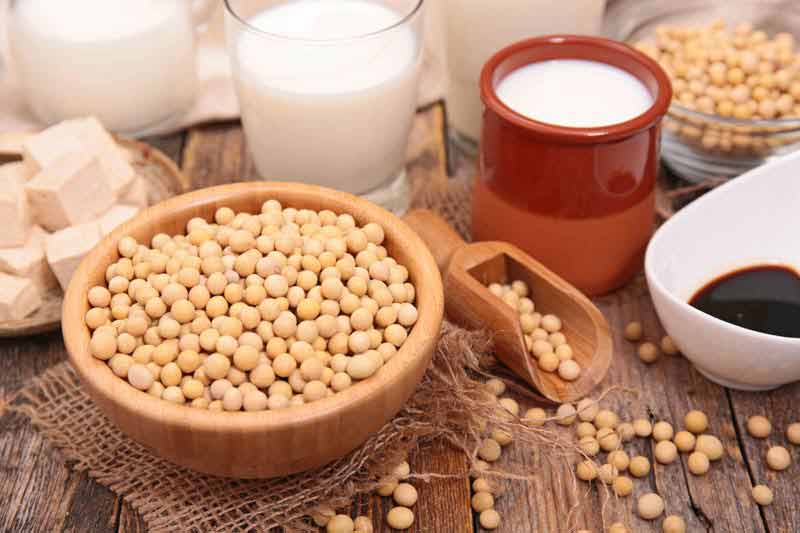
Edamame
Nutrition facts for ½ cup of edamame:
Calories: 94 | Fat: 4.03 g | Protein: 9.23 g | Total Carbs: 6.91 g | Fiber: 4 g | Net Carbs: 2.91 g
Tofu
Nutrition facts for 1 slice (84 g) of silken tofu:
Calories: 46 | Fat: 2.27 g | Protein: 4.03 g | Total Carbs: 2.44 g | Fiber: 0.1 g | Net Carbs: 2.34 g
Tempeh
Nutrition facts for 50 g of cooked tempeh:
Calories: 98 | Fat: 5.69 g | Protein: 9.96 g | Total Carbs: 3.81 g | Fiber: 0 g | Net Carbs: 3.81 g
Natto
Nutrition facts for ½ cup of natto:
Calories: 185 | Fat: 9.62 g | Protein: 16.97 g | Total Carbs: 11.10 g | Fiber: 4.7 g | Net Carbs: 6.4 g
Soy milk
Nutrition facts for 1 cup of unsweetened soy milk:
Calories: 80 | Fat: 4 g | Protein: 7 g | Total Carbs: 4 g | Fiber: 1 g | Net Carbs: 3 g
Vegetarian Protein “Products”
There are many vegetarian protein products and faux meats made from soy and wheat protein, such as Tofurkey. While others are made of mycoprotein (protein created from fermented fungi).
While these meatless products do contain protein and fiber they are also highly processed and are not as healthy for you as whole foods.
A healthy diet will keep processed products like these to a minimum.
Quorn
Nutrition facts for 1 Quorn (mycoprotein) vegetarian sausage patty:
Calories: 50 | Fat: 2 g | Protein: 5 g | Total Carbs: 4 g | Fiber: 2 g | Net Carbs: 2 g
Tofurkey
Nutrition facts for 1 serving (113 g) of Tofurkey plant-based burger:
Calories: 260 | Fat: 18 g | Protein: 15 g | Total Carbs: 10 g | Fiber: 6 g | Net Carbs: 4 g
Other Protein Sources
Bee pollen
Consuming bee pollen may sound a little odd, but pollen is actually a solid source of complete protein, along with containing every other nutrient the human body needs!
Bee pollen can be taken as a supplement or blended into a smoothie for added protein.
Nutrition facts for 1 teaspoon of bee pollen:
Calories: 15.7 | Fat: 0.2 g | Protein: 1.2 g | Total Carbs: 2.2 g | Fiber: 0.4 g | Net Carbs: 1.8 g
Nutritional yeast
Nutritional yeast is popular in the vegan community because it’s not only a source of complete protein but contains vitamin B12 (a nutrient that is otherwise only found in animal products). Beyond this benefit, nutritional yeast also contains protein and it has a pleasant “cheese-like” flavor.
It can be added to scrambled eggs, mixed into soups, and whipped into sauces for a creamy texture and rich flavor.
Nutrition facts for ¼ cup (15 g) of nutritional yeast:
Calories: 60 | Fat: 0.5 g | Protein: 8 g | Total Carbs: 5 g | Fiber: 3 g | Net Carbs: 2 g
Protein Powder
Protein powder is an easy way to get protein on the go. When choosing a protein powder look for a sugar free option (stevia or monk fruit are safe sweeteners) and pick a powder that has 10 ingredients or less.
While protein powder isn’t technically a “whole food” you still want to get the cleanest product available. The less processed junk in your protein powder, the better (and some of them can contain lots of junk!).
Also, consider choosing whey over pea or soy protein. Whey tends to have higher quality amino acids than plant based protein powders and is often much lower in carbs as well.
Here are the average nutrition facts for 1 scoop (33 g) of sugar free whey protein powder:
Calories: 130 | Fat: 2.5 g | Protein: 24 g | Total Carbs: 3 g | Fiber: 1 g | Net Carbs: 2 g
High Protein Veggies
No healthy diet would be complete without a huge helping of vegetables – especially a vegetarian diet!
Veggies like mushrooms, Brussel sprouts, broccoli, and asparagus have plenty of protein to offer in addition to micronutrients and fiber.
However, the proteins in these plant foods are still incomplete proteins so you can’t rely solely on vegetables and fruits to supply all the protein you need.
Mushrooms
Nutrition facts for 100 g of portabella mushroom:
Calories: 22 | Fat: 0.35 g | Protein: 2.11 g | Total Carbs: 3.87 g | Fiber: 1.3 g | Net Carbs: 2.57 g
Brussel sprouts
Nutrition facts for 100 g of Brussel sprouts:
Calories: 43 | Fat: 0.3 g | Protein: 3.38 g | Total Carbs: 8.95 g | Fiber: 3.8 g | Net Carbs: 5.15 g
Broccoli
Nutrition facts for 100 g of broccoli:
Calories: 34 | Fat: 0.37 g | Protein: 2.82 g | Total Carbs: 6.64 g | Fiber: 2.6 g | Net Carbs: 4.04 g
Asparagus
Nutrition facts for 100 g of asparagus:
Calories: 20 | Fat: 0.12 g | Protein: 2.2 g | Total Carbs: 3.88 g | Fiber: 2.1 g | Net Carbs: 1.78 g
What About “Food Combining?”
Food combining is a technique that is sometimes used by vegetarians and vegans to help them get enough complete protein from the plant foods they’re consuming.
For example, it’s common to mix two incomplete proteins like rice and beans together in order to make a complete protein. While this does work, when you have type 2 diabetes or prediabetes, combining two high carb foods isn’t the healthiest way to get complete proteins into your diet. Quite simply because you may struggle more to maintain healthy blood sugar levels.
Let’s look at the nutrition facts for 1 cup of cooked brown rice:
Calories: 248 | Fat: 1.96 g | Protein: 5.53 g | Total Carbs: 51.67 g | Fiber: 3.2 g | Net Carbs: 48.47 g
That cup of brown rice contains almost 50 g of net carbs and only yields 5.5 g of protein.
When you mix that rice with a half cup of black beans (11.56 g of carbs) you get over 60 g of carbohydrates, which is way too many carbs for one sitting. So while you may end up with a complete protein by the end, you also end up with a blood sugar disaster!
Oatmeal is another grain that vegetarians might see as a favorable option to add some protein to their breakfast. However, oatmeal is also incredibly high in carbs.
Here’s the nutrition facts for 1 cup of cooked oatmeal (oat bran):
Calories: 88 | Fat: 1.88 g | Protein: 7.03 g | Total Carbs: 25.05 g | Fiber: 5.7 g | Net Carbs: 19.35 g
The 7 g of protein is nice, but it doesn’t override the 19 g of net carbs, and a carb heavy breakfast just isn’t a great way to start off your day.
Similar to rice and oatmeal, other grains like quinoa, buckwheat, and amaranth may contain some protein but they also contain too many carbs to make them worth your while. And combining multiple high carb foods together certainly won’t give you the results you’re looking for.
Therefore, if you are looking to combine foods, choose from the vegetarian protein sources listed above.
Conclusion
Since getting complete proteins is most important to us all, the best vegetarian protein sources for obtaining all 9 essential amino acids (complete proteins) are:
- Eggs
- Dairy products
- Soy – tofu, tempeh, edamame, soy milk
- Bee pollen
- Nutritional yeast
- Chia seeds
- Hemp seeds
Of course, having a variety of other healthy vegetarian foods in your diet also provides a wonderful array of amino acids to your body, too.

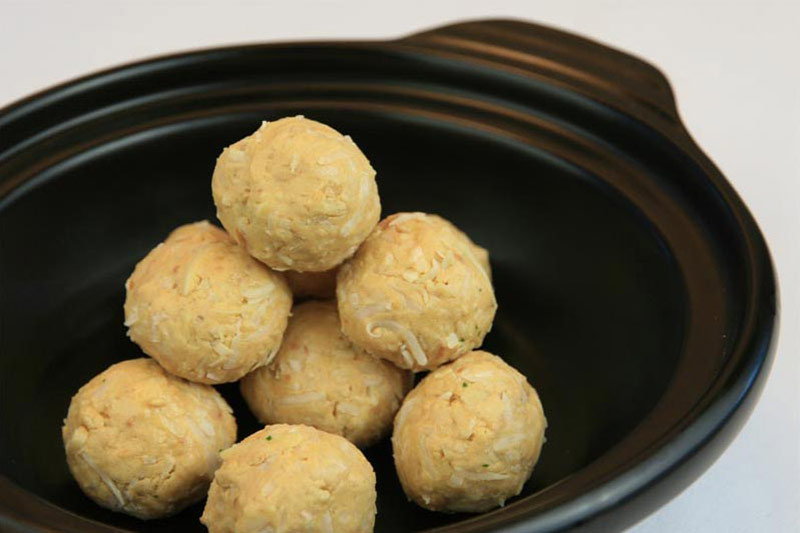
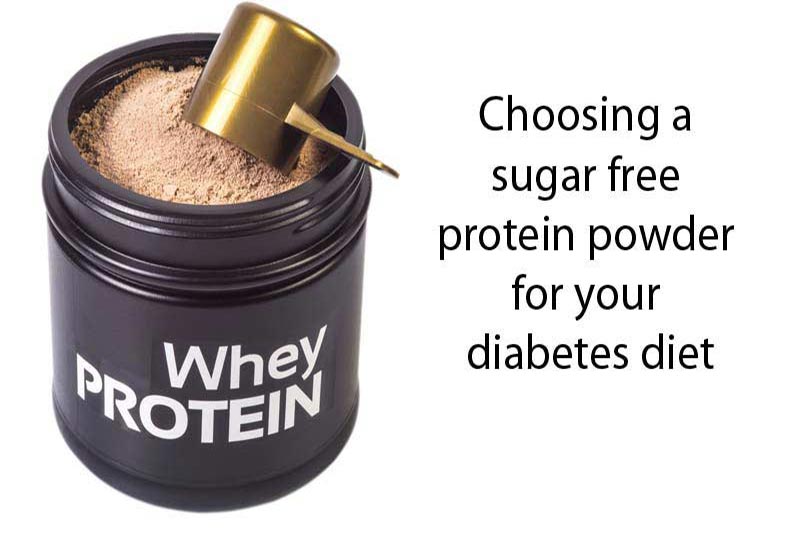
Val
Hi Jedha, I found Eden Organic Black Soybeans in cans. 1/2 cup has 120 calories, Total Carbs 8g, Dietary Fiber 7g, Sugar 1g so net carb of 1g, Protein 11g. It can be used just like regular beans in soups, salads, etc. It is hard to find and costs more than regular beans. I saw it only on health food sites. I wonder if many people know about it or use it. I just found it by accident while looking up information on other beans. I’m going to try it since regular pinto and other beans are so high in carbs.